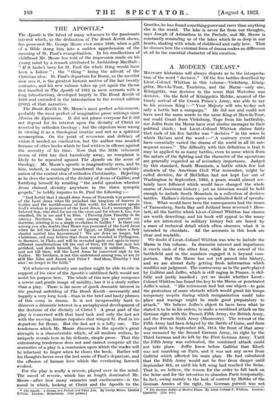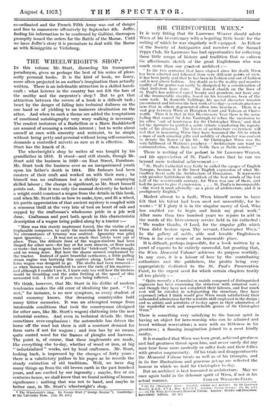A MODERN CREASY.*
MILITARY historians will always dispute as to the interpreta- tion of the word " decisive." Of the five battles described by Lieut.-Colonel Whitton in this volume—Vicksburg, Konig- gratz, Mars-la-Tour, Tsushima, and the Marne—only one, Koniggrgaz, was decisive in the sense that Waterloo was decisive. On the field of Koniggratz Moltke, assured of the timely arrival of the Crown Prince's Army, was able to say to his anxious King :—" Your Majesty will win to-day not only a battle but a campaign." He did not and could not have used the same words to the same King at Mars-la-Tour, nor could Grant from Vicksburg, Togo from his battleship, nor Joffre from the Marne have sent similar messages to their political chiefs ; but Lieut.-Colonel Whitton claims fairly that each of his five battles was " decisive " in the sense in which Hallam used the word :—" A contrary event would have essentially varied the drama of the world in all its sub- sequent scenes." The difficulty with this definition is that it may be applied to so many battles, even to some which from the nature of the fighting and the character of the operations are generally regarded as of secondary importance. Judged by this standard, South Mountain, a battle which few but students of the American Civil War remember, might be called decisive, for if McClellan had not kept Lee out of Washington in September, 1862, a peace would almost cer- tainly have followed which would have changed the whole course of American history ; yet no historian would be bold enough to include South Mountain in a collection of decisive battles. Hallam's dictum opens an unlimited field of specula- tion. What would have been the consequences had the issues of Tannenberg, Suvla Bay and Jutland been reversed ? How- beit, all the battles which Lieut.-Colonel Whitton has chosen are worth describing, and his book will appeal to the many who are interested in military history but are bored by a mass of technical detail which often obscures what it is intended to elucidate. All the accounts in this book are clear and readable.
We doubt if Lieut.-Colonel Whitton was wise to include the Marne in this volume. In dramatic interest and importance it excels each of the other four, while in the extent of the battlefield and in the numbers engaged it is beyond com- parison. But the Marne has not yet passed into history, and we are almost daily getting fresh information which modifies our judgment. The controversy as to the parts played by Gallieni and Joffre, which is still raging in France, is skil- fully and justly handled ; yet we doubt whether Lieut.- Colonel Whitton has found the key to the Marne or penetrated Joffre's mind. " His retirement had but one object—to gain the protection of some obstacle which would grant his troops temporary respite during which reorganization could take place and wastage might be made good preparatory to attack." We believe Joffre's object to have been what he stated it to be in his orders, to make a combined attack on the German right with the French Fifth Army, the British Army, and the French Sixth Army (Maunoury). The retreat of the Fifth Army had been delayed by the Battle of Guise, and from August 30th to September 4th, 1914, the front of that army • was menaced by the Second German Army, its right by the Third German and its left by the First German Army. Until the Fifth Army was extricated, the combined attack could not take place. Joffre knew before Gallieni that Kluck was not marching on Paris, and it was not any news from , Gallieni which affected his main plan. He had calculated that the Fifth Army would not be free from danger until September 6th, or until his left wing had reached the Seine. That is, we believe, the reason for the order to fall back on the Seine and for the intention to abandon Paris temporarily. In fact, owing mainly to the lack of control by Moltke of the German Armies of the right, the German pursuit was not
• The Decisive Battles of Modern Times. By Lieut.-Colonel F. Whitton. London: Constable. 1129. net.]
co-ordinated and the French Fifth Army was out of danger and free to manoeuvre offensively by September 4th. Joffre, finding his information to be confirmed by GalUni, thereupon promptly issued the orders for the Battle of the Marne. Until we have Joffre's story it is premature to deal with the Marne as with Koniggratz or Vicksburg.



































 Previous page
Previous page